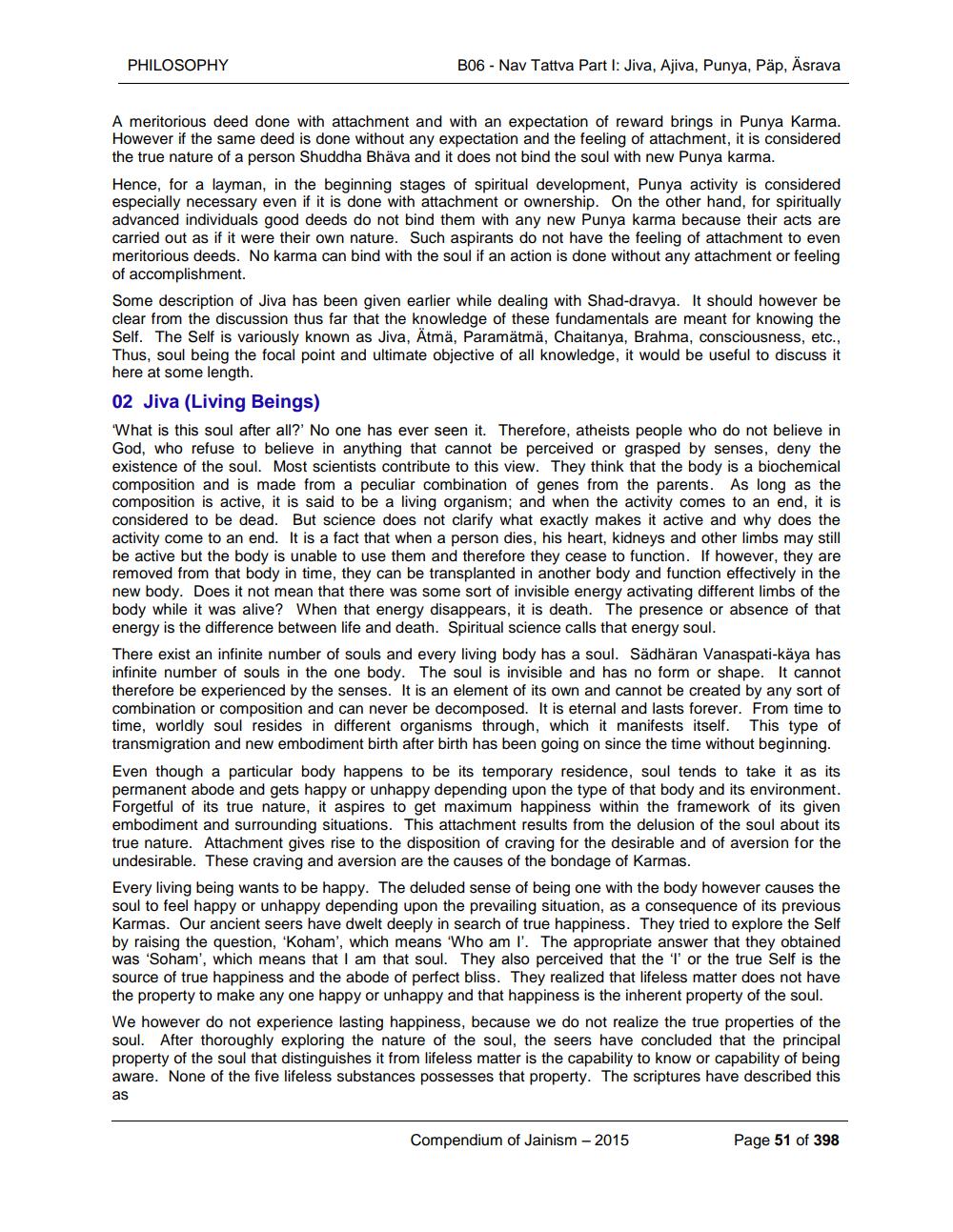________________
PHILOSOPHY
B06Nav Tattva Part I: Jiva, Ajiva, Punya, Päp, Äsrava
A meritorious deed done with attachment and with an expectation of reward brings in Punya Karma. However if the same deed is done without any expectation and the feeling of attachment, it is considered the true nature of a person Shuddha Bhäva and it does not bind the soul with new Punya karma.
Hence, for a layman, in the beginning stages of spiritual development, Punya activity is considered especially necessary even if it is done with attachment or ownership. On the other hand, for spiritually advanced individuals good deeds do not bind them with any new Punya karma because their acts are carried out as if it were their own nature. Such aspirants do not have the feeling of attachment to even meritorious deeds. No karma can bind with the soul if an action is done without any attachment or feeling of accomplishment.
Some description of Jiva has been given earlier while dealing with Shad-dravya. It should however be clear from the discussion thus far that the knowledge of these fundamentals are meant for knowing the Self. The Self is variously known as Jiva, Ätmä, Paramätmä, Chaitanya, Brahma, consciousness, etc., Thus, soul being the focal point and ultimate objective of all knowledge, it would be useful to discuss it here at some length.
02 Jiva (Living Beings)
'What is this soul after all?' No one has ever seen it. Therefore, atheists people who do not believe in God, who refuse to believe in anything that cannot be perceived or grasped by senses, deny the existence of the soul. Most scientists contribute to this view. They think that the body is a biochemical composition and is made from a peculiar combination of genes from the parents. As long as the composition is active, it is said to be a living organism; and when the activity comes to an end, it is considered to be dead. But science does not clarify what exactly makes it active and why does the activity come to an end. It is a fact that when a person dies, his heart, kidneys and other limbs may still be active but the body is unable to use them and therefore they cease to function. If however, they are removed from that body in time, they can be transplanted in another body and function effectively in the new body. Does it not mean that there was some sort of invisible energy activating different limbs of the body while it was alive? When that energy disappears, it is death. The presence or absence of that energy is the difference between life and death. Spiritual science calls that energy soul.
There exist an infinite number of souls and every living body has a soul. Sädhäran Vanaspati-käya has infinite number of souls in the one body. The soul is invisible and has no form or shape. It cannot therefore be experienced by the senses. It is an element of its own and cannot be created by any sort of combination or composition and can never be decomposed. It is eternal and lasts forever. From time to time, worldly soul resides in different organisms through, which it manifests itself. This type of transmigration and new embodiment birth after birth has been going on since the time without beginning.
Even though a particular body happens to be its temporary residence, soul tends to take it as its permanent abode and gets happy or unhappy depending upon the type of that body and its environment. Forgetful of its true nature, it aspires to get maximum happiness within the framework of its given embodiment and surrounding situations. This attachment results from the delusion of the soul about its true nature. Attachment gives rise to the disposition of craving for the desirable and of aversion for the undesirable. These craving and aversion are the causes of the bondage of Karmas.
Every living being wants to be happy. The deluded sense of being one with the body however causes the soul to feel happy or unhappy depending upon the prevailing situation, as a consequence of its previous Karmas. Our ancient seers have dwelt deeply in search of true happiness. They tried to explore the Self by raising the question, 'Koham', which means 'Who am I'. The appropriate answer that they obtained was 'Soham', which means that I am that soul. They also perceived that the 'I' or the true Self is the source of true happiness and the abode of perfect bliss. They realized that lifeless matter does not have the property to make any one happy or unhappy and that happiness is the inherent property of the soul. We however do not experience lasting happiness, because we do not realize the true properties of the soul. After thoroughly exploring the nature of the soul, the seers have concluded that the principal property of the soul that distinguishes it from lifeless matter is the capability to know or capability of being aware. None of the five lifeless substances possesses that property. The scriptures have described this
as
Compendium of Jainism - 2015
Page 51 of 398




